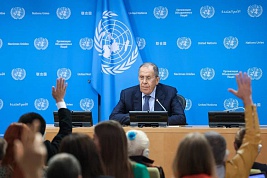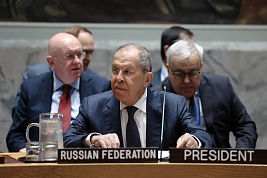Press release on the UN General Assembly vote on the Russian draft resolution on countering cybercrime
On December 27, by majority vote, the UN General Assembly in New York adopted the resolution “Countering the use of information and communications technologies for criminal purposes,” sponsored by the Russian Federation.
The resolution was co-sponsored by 47 states (Azerbaijan, Algeria, Angola, Antigua and Barbuda, Armenia, Belarus, Benin, Bolivia, Burundi, Venezuela, Guinea, Egypt, Zimbabwe, India, Indonesia, Iran, Kazakhstan, Cambodia, Cameroon, Kyrgyzstan, DPRK, PRC, the Congo, Cuba, Laos, Libya, Madagascar, Myanmar, Nauru, Niger, Nicaragua, Russia, St Vincent and the Grenadines, Syria, Sudan, Surinam, Tajikistan, Togo, Turkmenistan, Central African Republic, Uganda, Uzbekistan, Equatorial Guinea, Eritrea, Eswatini, the RSA, and Jamaica. A total of 79 states voted in favour, with 60 states against (including the US, the UK, Georgia, the EU, Israel, Canada, and Ukraine) and 33 abstained.
The adoption of the resolution shows that the world community urgently needs to develop a universal, comprehensive and open-ended convention on countering cybercrime due to its having become a transnational, cross-border issue.
The resolution proposed by Russia essentially enhances states’ digital sovereignty over their information space and ushers in a new page in the history of global efforts to counter cybercrime. In practical terms, a negotiation platform is being established under UN General Assembly auspices to develop a comprehensive international convention on countering cybercrime. A special committee with experts from every country would be such an international body. Formerly, the UN Convention against Corruption and the UN Convention against Transnational Organised Crime took a similar path.
Russia and like-minded nations view the convention as another universal and comprehensive international law enforcement tool which is focussed on crime involving information and communication technologies and is designed to counter their illegal use. The convention must be based on the principles of respecting state sovereignty and non-interference in internal affairs.
The resolution expressly provides that the committee would take into account the respective international and regional instruments and would also take into consideration the final recommendations of the Vienna group of experts on cybercrime.
The Committee is expected to hold its first organisational session in New York in 2020 while substantive work on the text of the convention will start in 2021.


